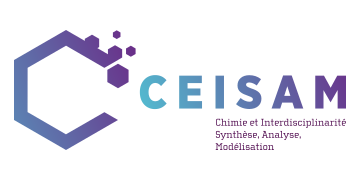Following Lucas DE BIASI’s PhD defense, Christelle HUREAU (LCC, Toulouse) will give a seminar entitled: “Contribution of coordination chemistry to a better understanding of Alzheimer’s disease and to an improved design of drug candidates” on Thursday, November 13, 2025, at 2:00 p.m. in the LS2N auditorium.
Christelle Hureau is the head of the “Alzheimer, Amyloids and Bio-Inorganic Chemistry (ALAMBIC, https://hureaulab.wixsite.com/equipeflcc)” group at the Coordination Chemistry Lab in Toulouse · She did her PhD in Orsay (France) on the coordination chemistry of Mn-based structural models of the water-oxidizing centre in the Photosystem II and graduated in 2003. Then she made three post-docs at the frontier between chemistry, biochemistry and advanced spectroscopy and electrochemistry · She is interested in the impact of metallic ions in Alzheimer’s disease (AD) and other amyloid-related diseases, in the design and study of new drug candidates targeting copper ions, and of inorganic compounds able to tune the self-assembly of the Aβ peptide, involved in AD.
Contribution of coordination chemistry to a better understanding of Alzheimer’s disease and to an improved design of drug candidates.
Alzheimer’s disease (AD) is a neurodegenerative disorder characterized post-mortem by amyloid deposits consisting of aggregates of amyloid-β (Aβ) peptides and containing high levels of Cu and Zn metal ions. They have been implicated in early processes linked to the development of the disease, namely the modulation of Aβ peptide self-assembly but also the participation in oxidative stress, via the production of reactive oxygen species (ROS) induced by the Cu(Aβ) complex. These effects will be described at both molecular (ROS production) and supra-molecular levels (peptide self-assembly). Therapeutic approaches will also be illustrated, focusing on Cu-selective chelators and inorganic Aβ self-assembly modulators.


